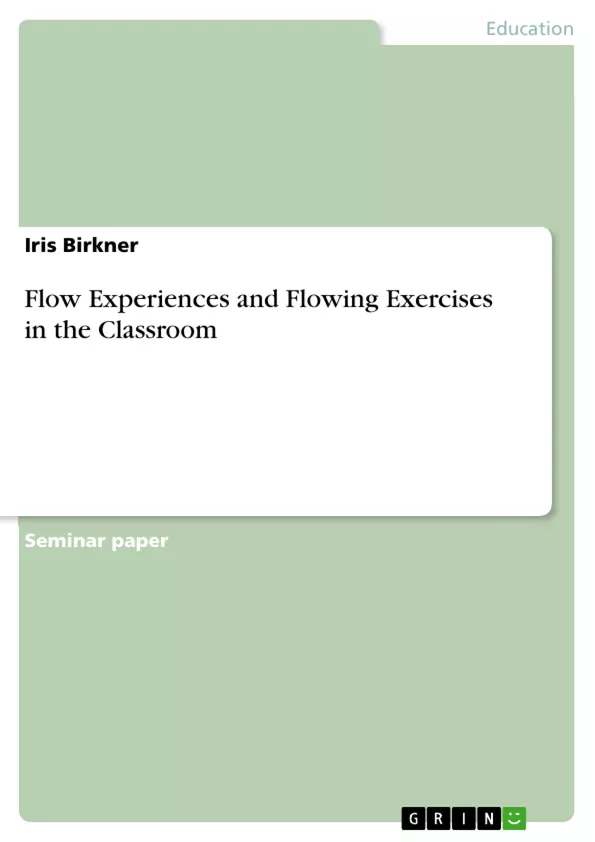Over the years, the concepts and methods of education have changed and we can see a trend away from only memorizing content and facts for a short period of time towards more alternative methods such as different motivational approaches which helps the students to memorize contents for a longer period of time. Elements of Positive Psychology (Martin Seligman) and Flow Experiences (Mihaly Csikszentmihaly) are principles which now occur in the school curriculum of many schools in Germany. ‘Schulfach Glück’ includes those principles and is a concept to foster the students’ autonomy and their abilities to reflect on themselves and helps the students to actively incorporate and participate in the classroom by being a welcome change of the usual framework.
The first part of this paper deals with the psychological aspects and backgrounds of flow including the eight characteristics of flow experiences.
The second part will examine the flow experience class taught in the seminar, the planning process of the lesson, as well as the didactic and methodic considerations of the class. I will also evaluate the implications that this topic had for me and my future teaching and reflect the taught session and the topic.
Inhaltsverzeichnis (Table of Contents)
- Introduction
- The theory of flow
- Eight characteristics of flow experiences
- Planning of a lesson - Mein, dein, unser Reich
- Learner's prerequisites/ general preparation
- Aim of the lesson
- Presentation
- Reflection
- Conclusion
- Literatur
Zielsetzung und Themenschwerpunkte (Objectives and Key Themes)
This paper aims to explore the concept of flow experiences in a classroom setting, focusing on the theoretical framework of flow as developed by Mihaly Csikszentmihaly. The paper will analyze the application of this theory in a lesson plan, examining the didactic and methodic considerations of the class. It will also reflect on the implications of this topic for the author's future teaching.
- The theory of flow and its eight characteristics
- Application of flow theory in a classroom lesson
- Didactic and methodic considerations of flow-based teaching
- Reflection on the implications of flow theory for future teaching
- Flow as a method to foster students' autonomy and engagement
Zusammenfassung der Kapitel (Chapter Summaries)
The introduction presents the concept of flow experiences as a path to happiness, contrasting it with the emphasis on material wealth in contemporary society. The author draws on the work of Mihaly Csikszentmihaly, who defines flow as a state of complete absorption in an activity.
The second chapter delves into the theory of flow, outlining its main characteristics as identified by Csikszentmihaly. The author emphasizes the universality of flow experiences, regardless of culture, age, social class, or gender.
The third chapter focuses on the planning of a lesson based on flow principles. This chapter discusses the learner prerequisites, the lesson’s objective, and the didactic and methodic considerations involved in applying flow theory in a classroom setting.
Schlüsselwörter (Keywords)
The main keywords and focus topics of this paper include flow experiences, Mihaly Csikszentmihaly, Positive Psychology, didactic considerations, methodic considerations, lesson planning, student engagement, and autonomy.
Frequently Asked Questions
What is the "flow experience" in education?
Flow is a state of complete absorption in an activity, developed by Mihaly Csikszentmihaly, which helps students engage deeply and memorize content for longer periods.
How many characteristics of flow are identified?
The theory identifies eight specific characteristics that define the flow experience, regardless of the individual's culture or age.
What is the "Schulfach Glück" concept?
It is a school subject concept in Germany that incorporates Positive Psychology and flow principles to foster student autonomy and self-reflection.
How can a teacher plan a lesson for flow?
Lesson planning involves setting clear aims, considering learner prerequisites, and using didactic methods that balance challenge and skill to prevent boredom or anxiety.
Why is flow considered an alternative to traditional memorization?
Instead of rote learning, flow focuses on motivational approaches that make the learning process intrinsically rewarding and participation-based.
- Quote paper
- Iris Birkner (Author), 2013, Flow Experiences and Flowing Exercises in the Classroom, Munich, GRIN Verlag, https://www.grin.com/document/379743



